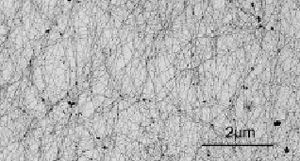Biopolymers of the cytosceleton, molecular motors
Most cellular processes are regulated by the cytoskeleton a filamentous network inside living cells. The cytoskeleton is responsible for a manifold of tasks, one of the most obvious is maintaining the cellular shape and the cells’ mechanical stability. The malfunctioning of the cytoskeleton (especially its regulation) has severe consequences for the cell and thus for the organism. In cancer the reorganisation of the cytoskeleton, concomitant with the loss of adhesion to the tissue, results in mobile cells. These mobile cancerous cells are able to cross the tissue boundaries and thus result in spreading the cancer to different organs: the metastasis of the cancer.
Here, we study the collective phenomena in biopolymer networks of the cytoskeleton. One major aim is to understand actin networks, where active molecular motors are embedded in. These active networks are studied by microrheological methods, where nanoprobes are embedded in the network and their response functions are measured. The frequency dependent viscoelastic moduli give a detailed insight into the underlying microsopic physical processes.
